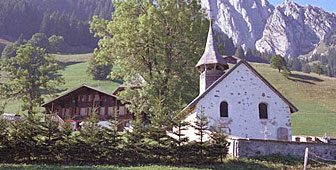Villagers struggle to make ends meet

A lack of jobs is forcing many mountain villagers to leave their homes. Mark Ledsom paid a visit to Abländschen, which depends on tourism to survive.
Nestling high in the Bernese Oberland, the picturesque village of Abländschen is a paradise for hikers and lovers of the quiet life, but it’s certainly no haven for job-seekers.
The village grocery store has long since disappeared, and a year ago Abländschen’s post office was closed down, as part of a national programme of cuts. Next to the mailbox that now serves as the only postal link with the outside world, the village notice board advertises the existence of just five small businesses and four mountain restaurants.
Lunchtime at the Restaurant zum Weissen Kreuz rarely involves a fight for tables, even when the village is basking in strong July sunshine. Four elderly hikers and a single motorist were taking coffee on the terrace when I dropped by. Unsurprisingly, restaurant owner Monika Liechti isn’t looking to expand.
“If it wasn’t for the tourists, it would be impossible to make any kind of living here,” Liechti says with a shrug. “Even with the tourism, things are tough. Since taking this place over from my parents four years ago, I’ve tried staying open through the winter, but this year I think I’ll just keep it running in the summer months.”
Just a minute’s walk from the restaurant is the schoolhouse where Liechti was educated. When she was a girl, there were 25 children in the class. Now there are five.
Urban migration
Nine-year-old René Fuhrer is one of the current attendees. Although questions of urban migration aren’t yet distracting him from his homework, the youngster seems pretty keen to stay in the countryside.
“I can’t stand all the car noise in towns,” René explains. The experience of older villagers suggest though that he might have to get used to city life in the years ahead.
“I can only get holiday work here,” says Daniel Reuteler, as he cuts the grass in the meadow above the schoolhouse.
Reuteler, who also attended the village school and still lives with his parents in Abländschen, works most of his time at a centre for the mentally disabled in the nearby town of Zweisimmen.
Away from the bright lights
Although Reuteler hasn’t yet joined his former classmates in making a permanent move from the village, he admits that life isn’t easy away from the bright lights.
“It’s particularly hard for the older people, like my parents, with no facilities available in the village itself,” Reuteler points out. “And it’s getting harder all the time. When I was growing up I reckon there were about 60 people living here all year round. There are probably around 30 to 40 now.”
The lack of decent job prospects appears to be the overriding cause for this exodus. The five businesses advertised on the village notice board are certainly not major industries – a roof mender, two wood cutters, a glassware manufacturer and a ski hire shop seem to make up the majority of the workforce in Abländschen.
A visit to the glassware manufacturer is worthwhile, but hardly indicative of thriving new business in the region, being run more as a hobby by retired villager Brigitte Grandpierre.
Died out
“Life just seems to have died out in Abländschen,” sighs Grandpierre, who first came to the village with her husband in 1958. A former hair salon owner, Grandpierre began making glass animals and lampshades as a way of keeping busy after her husband’s death.
“I couldn’t live in this village without having something to do with my time,” she insists. “When I first came here there were always big parties and dances being held in the village. It was a farming village with plenty of people working on the land. Now all the houses have been turned into holiday homes for people who spend just a week or two here each year.”
The investments made by those holidaymakers and the stunning natural scenery of the nearby mountains have helped maintain Abländschen’s good looks and quaint charm. But a walk along its empty main road lends weight to the argument that the village has lost its soul along with its original inhabitants.
Grandpierre, who can only sell her glassware by travelling to markets in neighbouring towns, isn’t optimistic about the village’s future. She sees the situation in Abländschen as a vicious circle in which the symptoms of urban migration actually become part of the disease.
“With so many people leaving, we are losing the sense of community that is needed to do something about the problem,” Grandpierre argues. “It’s not just the village that is becoming closed off but also the people. No-one here really comes together anymore, so how will it be possible for anything to change?”
by Mark Ledsom, Abländschen

In compliance with the JTI standards
More: SWI swissinfo.ch certified by the Journalism Trust Initiative
You can find an overview of ongoing debates with our journalists here. Please join us!
If you want to start a conversation about a topic raised in this article or want to report factual errors, email us at english@swissinfo.ch.